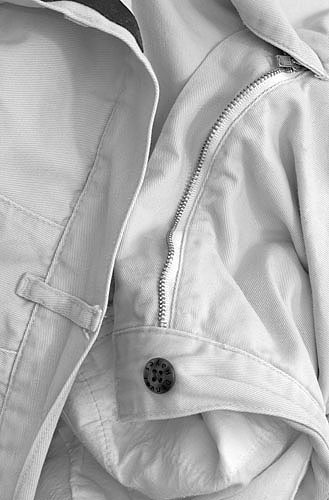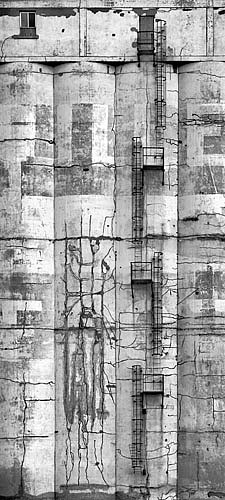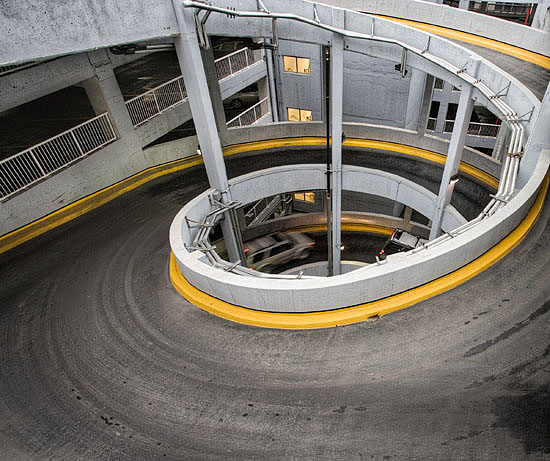
I think that “trying hard” is probably the worst thing you can do as a photographer. I don’t mean that you shouldn’t be careful, but rather that the harder you look for a good photograph, the less likely it is that you will find one.
This of course leaves you with the thought, “So, how the hell do I take good photographs if I’m not supposed to go looking for one?”
What if, instead of hunting for great images, you were to go out looking for things that interest you? I didn’t look for an interesting image in my bedroom; I simply observed that the shorts hanging there made an interesting pattern, and THEN wondered if it might make an interesting photograph despite being such an ordinary subject. The point is THE INTEREST COMES FIRST.

When I photographed ADM Flour Mill, the patterns made by the cracks in the concrete caught my interest and then the question was asked, “Could that make a good photograph?”
Imagine your English professor assigning an essay on a particular topic about which you have absolutely no interest. It’s possible to do the assignment, but the chances of creating a work of art in the essay has to be considered slim at best. On the other hand, for a subject that you feel very strongly about, you might write an essay whether or not anyone asks you to; whether or not you will receive credit for it; or whether or not you will be paid for it.
Mind you, you could easily argue that unless I’m quite odd (which is entirely possible), I wouldn’t have an interest in underwear (other than to find a clean pair), therefore the interest cannot have preceded the photograph. However, even with underwear, it was a simple observation that clothes dumped randomly on the floor or casually hanging up sometimes create interesting patterns. I looked at those patterns for most of my life before deciding to photograph them.
What I’m trying to say is that the interest usually preceded the finding of the photograph, and that what we should be looking for is not the photographable but the interesting, and I don’t think they are the same thing at all.

What if the very thing that you are interested in is the process of taking photographs? It’s all very well if you are a hiker or Sierra Club member, but what about the guy or gal who just enjoys mucking about with cameras? Are they to be discounted, doomed never to make a great photograph?
I began by suggesting that you have to be excited about the subject matter; that if you have no emotional response to your subject, how can anyone else have an emotional response to your photograph?
For example, can someone who thinks football is boring still take a great football picture? Can a photographer who is assigned to photograph a boxing match and who is disgusted by the whole thing still manage to make a photograph that shows the excitement of the sport?
Was Edward Weston obsessed with dead pelicans? I highly doubt it. What Edward Weston was excited about was shapes, curves and tones. He didn’t care a whit where he found shapes that excited him - whether a pepper in a funnel or a toilet shot from the floor - it didn’t mater a long as it had “the light”. Hell, we don’t even know if Edward Weston even liked to eat peppers!
If we take the same argument to the world of painting, we can ask if Rembrandt was obsessed with rich burghers of Ghent, or was he obsessed with light and composition and conveying facial expression?
Was Andy Warhol obsessed with Campbell’s tomato soup? Probably not.
What about Arnold Newman, the late great portrait photographer. Did he emotionally react to each of his sitters equally? Surely, some subjects didn’t interest him and it became an intellectual exercise to make a great portrait of a rather ordinary person.

I like photographing weathered industrial subjects. I’m not an engineer, I don’t tinker with old cars, nor is my backyard garden littered with odd bits of machinery. I like the old machinery because it photographs well, not because of some obsession I have about the past. I’m happy to photograph modern structures if they have the right tones and textures, eg. my parking garage series. I do park my car, but I’m not obsessed with parking structures.

These examples would suggest that interest in the subject matter is not, in fact, essential for a good photograph. Shouldn’t that mean that I can simply point my camera at anything, and as long as it’s possible to place it in an interesting composition a great photograph will ensue? If only that were the case!
Some subject matter excites us or challenges us due to it’s photographic characteristics, which has absolutely nothing to do with who or what is being photographed. When Edward Weston photographed José Clemente Orozco in 1930, what made the photograph interesting and challenging were the coke-bottle-bottom glasses the sitter was wearing, distorting the eyes and providing interesting highlights. One could imagine Weston making the portrait even if the sitter had been his garage mechanic’s unemployed ex-brother-in-law, instead of a famous mural painter.
But what does this mean to you and your photography? For a start, you can be excused for not having a passionate interest in your subject matter and you can still make great photographs; remember the pepper! It still means you need to be involved with your subject, just not necessarily for the obvious reasons. Your interest may come from the tonalities that will photograph well, the wonderful shapes, perhaps because of its oddity (think Diane Arbus), or simply because you know it’s something most of use would walk by without a second glance, and you would like the opportunity to show us what we missed.
Whether fascinated with the subject directly or only for its photographic possibilities, the interest still comes first. Only then can you start hunting for great images.
For more info about George Barr visit his web site. |